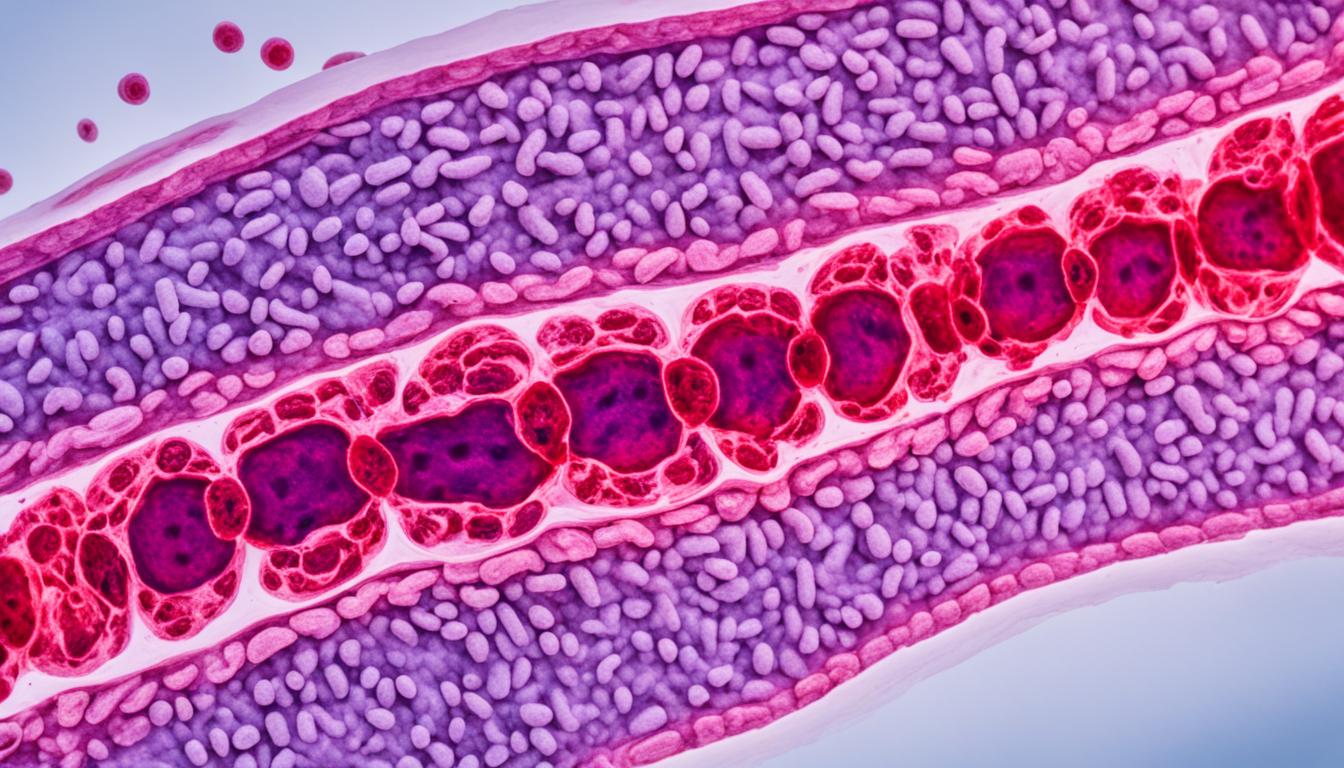Studies show around 1.6 million people worldwide have ulcerative colitis (UC). It affects more people between 15 and 30 years old. UC is an autoimmune disease. This means the body’s immune system wrongly fights the intestine’s healthy cells. The cause isn’t fully known, but family history and genetics play a role.
UC signs include bloody diarrhea, stomach pain, drop in weight, feeling tired, and less hungry. It’s diagnosed through tests like blood works, examining the inside of the intestines, biopsies, and scans. Currently, doctors treat UC with anti-inflammatory drugs and medicines that lower the immune response. But, these treatments aren’t perfect and can have some bad effects.
That’s why scientists are looking at new ways to treat UC, like using stem cells. So far, this method has shown good results in fighting off inflammation and helping the body to heal its tissues.
Key Takeaways:
- Ulcerative colitis is a chronic autoimmune disease that affects the intestines.
- Symptoms of UC include bloody diarrhea, abdominal pain, weight loss, fatigue, and decreased appetite.
- Genetics and family history can increase the risk of developing UC.
- Diagnosis involves various tests and scans to confirm the presence of UC.
- Standard treatment options for UC include anti-inflammatory drugs and immunosuppressants.
- Stem cell therapy is a promising alternative approach for managing UC.
- More research is needed to fully understand the potential of stem cell therapy in treating UC.
Understanding Ulcerative Colitis and its Complications
Ulcerative colitis mainly affects the colon and rectum, causing inflammation and ulcers. People with this disease might have symptoms like bloody diarrhea and stomach pain. Other signs include weight loss, feeling tired, and not wanting to eat.
This condition can vary from mild to severe and is judged by the symptoms and activity in the colon. When it gets worse (a flare-up), symptoms can get more intense, lowering the person’s quality of life.
It doesn’t just affect the gut; it can also lead to health problems such as:
- Mouth ulcers: Sores in the mouth that cause pain while eating or talking.
- Inflammation of the iris: Called uveitis, it makes the eye red, painful, and blurry.
- Arthritis: Causes pain and inflammation in the joints.
- Skin rashes: Long-lasting skin problems like erythema nodosum or pyoderma gangrenosum.
- Blood clot formation: Can cause serious issues like deep vein thrombosis.
- Lactose intolerance: Makes it hard to digest dairy.
- Anemia: A condition where the body lacks red blood cells, leading to tiredness and weakness.
- Increased risk of colorectal cancer: Chronic inflammation in the colon can increase the risk of colorectal cancer.
This disease can be triggered by certain drugs, stress, bad diet, and stomach infections. Early detection is key to starting the right treatment and avoiding further health issues. If you think you have ulcerative colitis, see a doctor promptly for proper care.
Stem Cell Therapy for Ulcerative Colitis
Mesenchymal stem cells (MSCs) are now a hopeful way to treat ulcerative colitis (UC) and other similar conditions. These special cells are pulled from a person’s bone marrow, fat, or blood. This means the body is less likely to reject them.
MSCs are great at calming down the immune system. They can lessen the body’s overreactions. This helps heal the colon and reduce inflammation. That’s why they’re seen as a good option for UC and aiming for a real cure.
Testing and research show promise in MSC stem cell therapy for UC. People who received these cells had less colon inflammation and better UC symptoms such as bloody stool and pain.
How Stem Cell Therapy Works
Once given to a patient, stem cells head towards the inflamed areas in the colon. They do this because the colon sends out signals that attract them. There, they calm down the reaction of the immune system. This reduces inflammation and helps repair the damaged area.
Additionally, MSCs can turn into different types of cells. These new cells help heal the tissue by repairing the colon’s lining and blood vessels. So, stem cell therapy not only fights inflammation but also helps with regrowth.
There’s still a lot to learn about using stem cells for UC. We need more research to make the treatment better and safer. But, the chance to change how we treat UC is a really exciting possibility.
| Treatment Advantages | Treatment Considerations |
|---|---|
|
|
Stem cell therapy is changing the game for UC treatments. This new way could be more focused and work better for people with UC.
Conclusion
Ulcerative colitis is a common, ongoing inflammation of the bowels that affects many worldwide. The usual treatments for this condition aim to reduce inflammation and deal with symptoms. These methods, however, come with their challenges and possible side effects.
Fortunately, a new treatment using stem cells has shown a lot of promise for ulcerative colitis. This method focuses on using special stem cells to lower inflammation and help damaged tissue heal. Although more study is necessary, this treatment shines with its potential to help.
People with ulcerative colitis should team up with their doctors to find what works best for them. Considering advanced treatments like stem cell therapy can help manage ulcerative colitis. This proactive move can significantly improve their quality of life.

